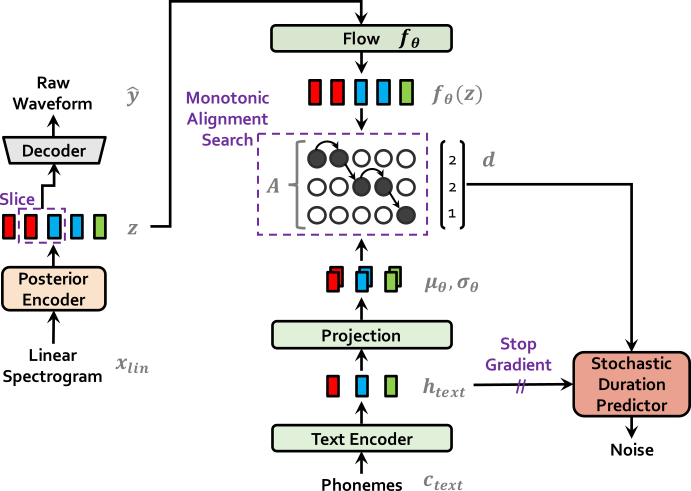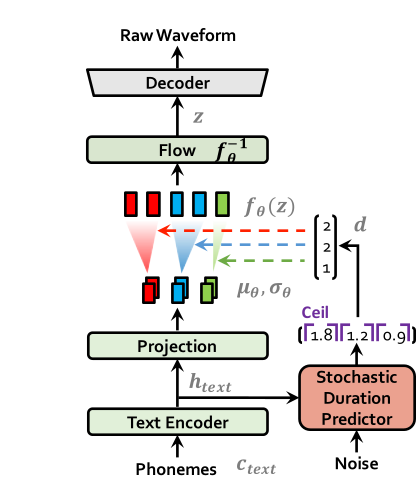模型和API均不再提供,大家可以使用我整理的数据集:点击这里
本repo包含了我用于训练原神VITS模型对源代码做出的修改,以及新的config文件。
请注意,下方的API均已经停止运行。
感谢星尘以及国家超级计算广州中心提供的算力支持,感谢VITS模型作者Jaehyeon Kim, Jungil Kong, and Juhee Son,感谢ContentVEC作者 Kaizhi Qian. 本模型训练时使用的所有音频文件版权属于米哈游科技(上海)有限公司。
支持的说话者: ['派蒙', '凯亚', '安柏', '丽莎', '琴', '香菱', '枫原万叶', '迪卢克', '温迪', '可莉', '早柚', '托马', '芭芭拉', '优菈', '云堇', '钟离', '魈', '凝光', '雷电将军', '北斗', '甘雨', '七七', '刻晴', '神里绫华', '戴因斯雷布', '雷泽', '神里绫人', '罗莎莉亚', '阿贝多', '八重神子', '宵宫', '荒泷一斗', '九条裟罗', '夜兰', '珊瑚宫心海', '五郎', '散兵', '女士', '达达利亚', '莫娜', '班尼特', '申鹤', '行秋', '烟绯', '久岐忍', '辛焱', '砂糖', '胡桃', '重云', '菲谢尔', '诺艾尔', '迪奥娜', '鹿野院平藏']
Query String 参数:
| 参数 | 类型 | 值 |
|---|---|---|
| text | 字符串 | 生成的文本,支持常见标点符号。英文可能无法正常生成,数字请转换为对应的汉字再进行生成。 |
| speaker | 字符串 | 说话者名称。必须是上面的名称之一。 |
| noise | 浮点数 | 生成时使用的 noise_factor,可用于控制感情等变化程度。默认为0.667。 |
| format | 字符串 | 生成语音的格式,必须为mp3或者wav。默认为mp3。 |
示例:http://233366.proxy.nscc-gz.cn:8888/?text=你好&speaker=枫原万叶
此外,也可以尝试使用公开的api:http://233366.proxy.nscc-gz.cn:8888/ 来进行尝试,此API可用于二创等用途,但禁止用于任何商业用途。 请注意多次生成的效果不会一致,可以多次尝试来选择一次较好的效果。 同时支持可视化合成:http://150.158.164.18:9069/ 感谢星尘以及国家超级计算广州中心提供的算力支持,感谢VITS模型作者Jaehyeon Kim, Jungil Kong, and Juhee Son,本模型训练时使用的所有音频文件版权属于米哈游科技(上海)有限公司。
Query String 参数:
| 参数 | 类型 | 值 |
|---|---|---|
| text | 字符串 | 生成的文本,支持常见标点符号。英文可能无法正常生成,数字请转换为对应的汉字再进行生成。 |
| speaker | 字符串 | 说话者名称。必须是上面的名称之一。 |
| noise | 浮点数 | 生成时使用的 noise_factor,可用于控制感情等变化程度。默认为0.667。 |
| noisew | 浮点数 | 生成时使用的 noise_factor_w,可用于控制音素发音长度变化程度。默认为0.8。 |
| length | 浮点数 | 生成时使用的 length_factor,可用于控制整体语速。默认为1.2。 |
| format | 字符串 | 生成语音的格式,必须为mp3或者wav。默认为mp3。 |
示例:http://233366.proxy.nscc-gz.cn:8888/?text=你好&speaker=派蒙
In our recent paper, we propose VITS: Conditional Variational Autoencoder with Adversarial Learning for End-to-End Text-to-Speech.
Several recent end-to-end text-to-speech (TTS) models enabling single-stage training and parallel sampling have been proposed, but their sample quality does not match that of two-stage TTS systems. In this work, we present a parallel end-to-end TTS method that generates more natural sounding audio than current two-stage models. Our method adopts variational inference augmented with normalizing flows and an adversarial training process, which improves the expressive power of generative modeling. We also propose a stochastic duration predictor to synthesize speech with diverse rhythms from input text. With the uncertainty modeling over latent variables and the stochastic duration predictor, our method expresses the natural one-to-many relationship in which a text input can be spoken in multiple ways with different pitches and rhythms. A subjective human evaluation (mean opinion score, or MOS) on the LJ Speech, a single speaker dataset, shows that our method outperforms the best publicly available TTS systems and achieves a MOS comparable to ground truth.
Visit our demo for audio samples.
We also provide the pretrained models.
** Update note: Thanks to Rishikesh (ऋषिकेश), our interactive TTS demo is now available on Colab Notebook.
| VITS at training | VITS at inference |
|---|---|
 |
 |
- Python >= 3.6
- Clone this repository
- Install python requirements. Please refer requirements.txt
- You may need to install espeak first:
apt-get install espeak
- You may need to install espeak first:
- Download datasets
- Download and extract the LJ Speech dataset, then rename or create a link to the dataset folder:
ln -s /path/to/LJSpeech-1.1/wavs DUMMY1 - For mult-speaker setting, download and extract the VCTK dataset, and downsample wav files to 22050 Hz. Then rename or create a link to the dataset folder:
ln -s /path/to/VCTK-Corpus/downsampled_wavs DUMMY2
- Download and extract the LJ Speech dataset, then rename or create a link to the dataset folder:
- Build Monotonic Alignment Search and run preprocessing if you use your own datasets.
# Cython-version Monotonoic Alignment Search
cd monotonic_align
python setup.py build_ext --inplace
# Preprocessing (g2p) for your own datasets. Preprocessed phonemes for LJ Speech and VCTK have been already provided.
# python preprocess.py --text_index 1 --filelists filelists/ljs_audio_text_train_filelist.txt filelists/ljs_audio_text_val_filelist.txt filelists/ljs_audio_text_test_filelist.txt
# python preprocess.py --text_index 2 --filelists filelists/vctk_audio_sid_text_train_filelist.txt filelists/vctk_audio_sid_text_val_filelist.txt filelists/vctk_audio_sid_text_test_filelist.txt# LJ Speech
python train.py -c configs/ljs_base.json -m ljs_base
# VCTK
python train_ms.py -c configs/vctk_base.json -m vctk_baseSee inference.ipynb